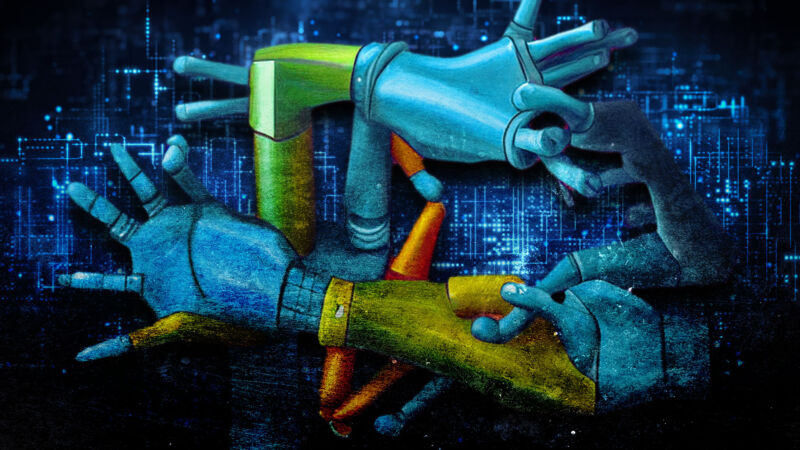English version below
Guten Abend, und willkommen zum Closing-Event. 4 Tage Veranstaltung haben wir jetzt hinter uns, nicht immer ist alles ganz gut gelaufen, aber hey, es war für uns alle das erste Mal und es war eine großartige Veranstaltung. Diese remote Chaos Experience war genau das: eine Chaos Experience, eine großartige. Ich hab es mehrfach geschafft, in die Lobby zu laufen, um an einen bestimmten Ort zu gehen, und wie auf jeder realen Congress-Veranstaltung mich 2 Stunden später an einem völlig anderen Ort, mit völlig fremden Leuten wiederzufinden, um etwas zu entdecken, von dem ich gar nicht wusste, dass es existiert.
Ich glaube, das ist Euch allen auch passiert. Ich glaube, dieses Event hat Geschichte geschrieben und Geschichten. Und weil der Winter die Zeit für Geschichten ist und Nerds irgendwie alle kleine Kinder sind, die gern Geschichten hören, hab ich Euch eine mitgebracht, und die werde ich Euch jetzt erzählen. Ah, da fällt mein Lesezeichen gleich weg … Na dann, ran an den Kamin, macht’s Euch gemütlich und viel Vergnügen beim Zuhören …
Es begab sich zu einer Zeit, dass das Volk der Nerds sein großes Jahresfest feiern wollte. Aber das Land war von einer Seuche heimgesucht, und es war gefährlich hinauszugehen und anderen Entitäten zu begegnen. Die Nerds klagten sehr, denn dieses Fest war der größte Feiertag in ihrer Welt. Dennoch waren sie alles kluge Wesen, und weil kluge Wesen keine anderen Wesen schädigen wollen, entschied das Festkomitee, dass die Feier im Jahre der Seuche ausfallen sollte.
Aber das Volk war ein starkes und kluges Volk, und so überlegten sie. Und jemand schlug vor, eine gewaltige künstliche Insel zu schaffen, die jeder mit seinem Seelenbild betreten könnte, statt mit dem Körper.
Doch das Festkomitee war müde, und man fragte sich, wer diese Insel bauen würden. Viele, viele Worte wurden hin und her gereicht und beantwortet und durchgestrichen und bunt bemalt, denn es dauert, bis frisch geschlüpfte Ideen reif sind.
Und schließlich traten ein paar Prinzessinnen vor und erklärten sich bereit, die Reise anzuführen. Sie scharten Baumeister und Ritterinnen um sich, sattelten ein paar Drachen und Einhörner und das Festkomitee gab ihnen Proviant, ein Buch voll Notizen eigener Erfahrungen und eine magische Brieftaube (nach RFC 2549). Und so zogen sie los, um den Ort zu suchen, wo diese Insel entstehen könnte.
Sie reisten über Berge und Täler, vorbei an den reißenden Flüssen des Stackoverflow, riesigen Schafherden auf den grünen Wiesen der Kommentarspalten, den bunten Marktplätzen der Video-Gaukler und Podcast-Hersteller und den heimeligen Hütten der Webseiten. Nach vielen Wochen der Reise erreichten sie ein kleines Tal, mit grünen Wiesen und viel Platz, und so kam man überein, die Insel hier, im Lande Neu, im Tal rC3 zu bauen.
Die Prinzessinnen sandten Boten auf Einhörnern und Drachen an die Heimatdörfer der Hackspaces, um ihnen Bescheid zu sagen, dass man einen Ort gefunden habe, doch einige dieser Boten verirrten sich im tiefen Dickicht der Foren und die Nachrichten erreichten das Ziel nicht.
Die Baumeister begannen zu planen, die Ritterinnen erkundeten das Gelände, um zu sehen, wie man es sichern könne gegen Spam, Systemausfälle und langweilige Menschen. Gaukler und Boten zogen mit Trommelwirbel durch die Lande und hängten Bekanntmachungen aus, um weitere Magier der Systemadministration und Meister der Codestruktur zu finden und das Volk zu informieren.
Das Land war brach und unwirtlich und so schickten sich unsere Helden an, erst einmal einen See zu erschaffen, der die Insel von den Weiten des Landes Neu trennen sollte.
Um diesen See überqueren zu können, würde man Boote brauchen, eines für jeden Gast, und so wurden die Schiffsbaumeister vom Stamme Tickets&Presale gefragt, und sie waren gern bereit, Boote zu bauen und zu verteilen.
Der Clan Eventphone bereitete sich vor, die Insel mit einem System auszustatten, das Kommunikation auch über weite Entfernungen ermöglichen sollte. Und selbst der Himmel entsandte seine Engel, um bei Erschaffung und Pflege der Insel zu helfen.
Viele Wesen und Dörfer trugen ihren Teil bei und so entstanden kleine Täler und Berge, Flüsse, Wiesen, Schaltungen und Flughäfen, Kirchen und Festhallen.
Dann kam der Tag des Presale, und eine Meute stürmte herbei! Sie standen am Ufer des Sees und wollten zur Insel übersetzen – und kamen nicht vom Fleck. Es waren zu viele!
Doch die Schiffbauer vom Clan Presale und Tickets waren unermüdlich! Sie bauten eine kleine Arche nach der anderen, um so vielen Nerds wie möglich die Chance zu geben, zur Insel zu reisen.
Sie bauten und tranken Mate und bauten weiter. Sie überzeugten die Ritterinnen von Infrastruktur und die Software-Magier, die Insel noch ein wenig zu vergrößern, nur ein wenig noch. (Es half auch durchaus, dass den Drachen das Feuerspeien untersagt wurde, so dass keine Rechenknechte mehr abbrannten.)
Und das Festkomitee sandte eine Taube und spendete Baumaterial, so dass Platz für noch ein paar mehr Gäste gefunden werden konnte.
Doch schließlich war es so weit, und so sehr man auch suchte, es konnte kein weiteres Blech für die Reiseboote gefunden werden.
Der Tag des Festes brach an und die Nerds bestiegen mit ihren Seelenbildern die Boote und reisten zur Insel, so dass die Häfen zeitweise keine Boote mehr aufnehmen konnten, denn für jedes davon musste ein Liegeplatz gefunden werden.
Alle waren sie gekommen.
Das rauschende Fest konnte beginnen. Im Hintergrund wurde noch fleißig gehämmert, während bereits in würdevoller Zeremonie das Eröffnungsbanner gehisst wurde. Die Magier des Hotpatches und der Software schwitzten tüchtig unter dem Ansturm der Menge. Doch zum Glück zerstreute sich das bunte Volk bald in verschiedene Dorfbauten der Assemblies. Doch diese Dorfbauten waren noch nicht mit genügend Leben gefüllt, so dass ein böser Zauber das Land befiel. Ein magischer Angriff des dDOS forderte alle Kräfte, so dass die Inseln in diesem magischen Sturm nicht untergehen. Und wie das so ist bei magischen Stürmen, in dieser Zeit konnte niemand mit einem Boot auf die Inseln übersetzen.
Also taten sich des Nachts alle Ritterinnen, Magier, Einhörner und Drachen zusammen, um die Sturmabwehr zu verstärken und noch mehr Schutzfeuer zu entzünden.
Die Dörfer und Clans und Stämme taten sich derweil zusammen und begannen, mehr Inhalte zu spawnen. Denn mehr Inhalte besänftigen magische Angreifer, indem sie diese ablenken, und erfreuen das Volk, indem sie blinken und piepsen und überhaupt sehr benutzbar sind.
Ein neuer Tag brach an … Und ein Jubel erfüllte die Inseln und erfreute die Datenreisenden. Stimmungsvolle und liebliche Tetrismelodien statt verzerrter Drehleier-Töne, bekannte Zeichen auf magischen Kacheln, welche sogar den Sinn eines TicTacToes-Spiels ergaben; altbekannte Ritualbauten wie eine Seidenstraße und sogar ein Postdienst wurden eingerichtet.
Für weitere Zerstreuung wurde genauso gesorgt wie für die bedauernswerten Engel, die viele ihrer früheren Aufgaben von den Festen vermissten. Der Flaschensammelsimulator erfreute sich hoher Beliebtheit, ebenso wie das Suchen und Finden von Ausgängen oder Formularen der Ausführungen 38A, 38B und 38C.
Doch der Frieden war noch nicht erreicht: Es gab wieder eine magische Attacke: Der Fluch der Unsichtbarkeit traf die Inseln, aber unsere tapfere Helden von der Serverburg bekämpften erfolgreich die Probleme des Dämonen Namenssystems, auf das die magischen Wegweiser wieder die Insel anzeigen könnten.
Erschöpfte Helden brauchen Pausen. Also Mate, Gespräche – und etwas gegen die Langeweile. Denn Helden, wenn sie nicht heldenhaft sein können, langweilen sich. Und daher wurden im ganzen Lande Quests ausgelobt, um sich Ritterorden und Badges für erwiesene Heldentaten zu erarbeiten. Und wie das so oft ist, fanden die ersten Helden jede Menge Nachahmer, denn auch diese wollten den Segen der Winkekatze und das Ansehen ihrer Clans erwerben.
Auch wenn einige der Orden es wirklich in sich hatten und die Suchenden um sie zu erlangen verwirrende Pfade beschreiten mussten, die sie fehlleiteten und in tiefste Katakomben führten, so erschuf einfach jedes Hackerspace seine eigenen Orden, und es gab genug, dass ein jeder einige erwerben konnte, wenn er sich darum bemühte.
Und weil so viele Heldentaten durstig machen und auch Helden den Wunsch nach Musik verspüren, wurden Feiern eingerichtet. So viele sogar, dass man am Ende keine weiteren Plätze mehr für sie fand und sogar die Orte der Notdurft dem Feiern dienten! Zum Glück kannten die Alteingesessen dies schon, und auch die Heiler der Clans gaben ihr Einverständnis.
Das Fest dauerte an, Tag und Nacht, das Siebtel eine Mondumlaufs lang. Inselreisende berichteten an die Bewohner des Landes Neu über die Reise und die Insel, und auch wenn nicht immer alle Bereiche zu finden waren und manche Zonen der Insel sich zeitweise zu verstecken schienen, so waren die Nerds doch glücklich, denn sie hätten ihr Fest und die Gelegenheit, mit allen Hackerspace-Dörfern zusammenzukommen, doch sehr vermisst. Viele von ihnen berichteten, hielten Reden und erzählten, was sich Jahre ergeben hat. Die Gelegenheit zum Austausch, zum Erfahrungsbericht und zum gemeinsamen Lernen ist der Grund, warum diese Feier so dringend gesucht wurde, warum sie stattfinden musste.
Doch eines Tages kam der Tag, an welchem das Fest zuende gehen sollte. Und alle waren sehr traurig, denn es war ein wunderbares, großartiges Fest gewesen. Doch die Baumeister hatten bereits am Anfang erklärt, dass künstliche Inseln nicht ewig zu halten sind, denn es ermüdet die Datenhexen und Bitmagier zu sehr, die Barrieren stabil zu halten und die Insel zu festigen.
So musste das Fest enden.
Aber die Prinzessinnen und Baumeister, die Steinmetzinnen und Magier, sie wollten alle dem Volk noch ein Geschenk machen. So dachten sie nach, was sie ihnen geben könnten und am Ende kam man überein: Das einzige und beste, was sich eignete, würden die Baupläne der Insel sein. Denn auch wenn es viele Magier und Ritterinnen und Prinzessinnen und Baumeister und Steinmetzinnen und sooo viele mehr brauchte, um diese Insel zu bauen, so sollte es möglich sein, statt dessen viele kleine Inseln zu entwerfen und sie mit magischen Wegweisern zu verbinden. So könnte sich jeder Hackspace-Clan eine eigene kleine Insel bauen und man könnte sich gegenseitig besuchen, solange die Seuche weiter wütet.
Man schrieb eine große Bekanntmachung und sandte sie mit RFC-konformen Tauben in alle Himmelsrichtungen: Die Magier würden nun zunächst ein wenig ruhen und dann einen Ort schaffen, um die Baupläne öffentlich auszuhängen. (Man war sich einig, dass Alpha Zentauri in diesem Falle nicht reichen würde.)
Die Dörfer empfingen die Tauben und lasen die Pläne und schufen ihre eigenen Inseln. Und es begann ein reger Reiseverkehr zwischen den Inseln, und man besuchte sich und sprach und hackte, denn das ist, was dieses Volk der Nerds, das man auch Chaos nennt, tut: Gemeinsam arbeiten für eine bessere Welt.
Und sie alle wussten, wenn sie nur zusammenhalten und gemeinsam stehen, dann würde man auch diese Zeit überstehen.
Und wenn die Server nicht geschmolzen sind, dann hacken sie noch heute!
Ja, das war die Geschichte, ich hoffe es hat Euch gefallen, sowohl hier, auf der rC3, als auch dieses kleine Märchen, und wer genau aufgepasst hat, hat gemerkt: Wir sind noch nicht ganz am Ende angekommen. Also viel Spaß heute nacht, viel Spaß beim Bau Eurer eigenen Inseln.
Alles Gute und auf ein besseres 2021!
[ENG]
Once upon a time, the people of the nerds wanted to celebrate their annual festival. But the lands were struck by a pestilence, and it was dangerous to go out and meet other entities. The nerds lamented, for their festival was the highest holiday in their world. But they were all wise creatures, and since wise creatures do not let other creatures come to harm, the committee decided that the celebration would be canceled in the year of the plague.
But the people were strong and wise, and so they pondered. And someone suggested to create an enormous artificial island, which everyone could enter with their avatar, instead of their physical presence.
But the committee was tired, and they asked who would build this island. Many, many words were passed back and forth, responded to, struck through again,and painted in gay colours, because a newly hatched idea needs time to grow.
And, finally, a few princesses stepped ahead, and declared they would lead the journey. They gathered builders and knights, saddled dragons and unicorns, and the committee gave them provisions, a book full of lore and their own stories and experiences, and a magical pigeon (conforming to RFC 2549). And they went forth to find the place where this island could spawn.
They journeyed across hills and mountains, passing the roaring rivers of Stackoverflow, the huge flocks of the green pastures of the comments, the gaudy market places of video jugglers and podcast artisans, and the homely homes of the World Wide Web. After many weeks they reached a small valley, where grass was green, and space was aplenty. and so they agreed to build the island here, in the Land of the Unchartered Internet, in the rC3 Valley.
The princesses sent messengers on unicorns and dragons to the home villages of their hackspaces to bring them the message that a place had been found, but some of their messengers got lost in the thickets of online fora, and their messages never reached their destination.
The builders began to plan, the knights explored the area, to find how it could be secured against Spam, Downtime, and Boring Humans. Jugglers and messengers rode the lands, carrying signal drums, posting announcements to gather more Wizards of System Administration, and Masters of Code Structure, and to inform the people. The land was empty and barren, and so our heros commenced by creating a lake to separate the island from the realms of the Land of the Unchartered Internet. To cross this lake, they would need boats, one for each guest, and so the shipmasters from the tribe of Tickets&Presale were asked, and they were all delighted to build the boats, and distribute them amongst the guests.
The clan of Eventphone prepared to equip the island with a system that would allow communication over vast distances, and Heaven itself sent their Angels to support the creation and care of the island.
Many creatures and villages contributed, and many small valleys and hills, rivers, pastures and utilities and airports, churches and halls were erected.
Then the day of presale arrived and a big pack came running! They were standing at the shore of the lake and wanted to cross – and nobody could move. The numbers were too high.
But the ship-builders of the clan of Presale and Tickets were untiring! They erected one small ark after another to let as many nerds as possible travel to the island.
They built and drank Mate and built again. They convinced the Knights of Infrastructure, and the Software Mages, to enlarge the island by another bit, just one more acre! (It mitigated that dragons were forbidden to spit fire, so no more computing serfs burned down).
And the Committee sent a pigeon and donned bricks and beams, so a place for even more guests could be made.
Finally the moment came. Wherever they looked, no more bare metal could be found for more boats.
The day of the festival broke, the nerds entered their boats with their avatars, and traveled to the island, so that every so often, the havens could not accept arriving boats, for not a single berth was vacant.
Everyone had come!
The Grand Celebration could begin! In the background, hammers could still be heard, as the opening banner was hoisted in a dignified ceremony. The Mages of Hotpatches and of Software groaned under the rush of Nerds. Luckily the colourful people soon distributed amongst the different villages of the assemblies. But the halls were not sufficiently filled with creatures yet, such that a Dark Magic fell over the land. A magical attack of the dDOS demanded all their prowess, so the islands would not fall to this magical storm. And since this is the way with magical storms, in those times no one could reach the islands. So when night fell, all knights, mages, unicorns, and dragons joined their forces to reinforce the fortress walls, and to kindle more protective fires.
The villages and clans and tribes came together and began to spawn more content. For more content would calm magical attackers, distract them, and also delight the people with their sparkling, blinkenlighting, and beeping, and it would be very useful overall.
A new dawn broke … and wild jubilation filled the islands, and enlightened the data travelers. Gaily and lovely tetris melodies replaced the lamenting sound of hurdy-gurdies, well-known signs on magical tiles, which even made sense as a Tic Tac Toe; well-known ritual buildings like a Silk Road, and even a postal service were created. More amusement was provided, even for those regrettable angels who missed doing many tasks common in previous festivals. The Bottle Collection Simulator was treasured, and so was searching and finding of exits, and filling in forms A38, B38, and C38.
But Peace was not won yet. Another magical attack! The Curse of Invisibility stroke the islands. But our brave heroes of Server Fortress fought the problems of the Demon Name System and prevailed, so the magical guide posts would guide travelers to the island again.
Tired heroes need breaks. Thus, Mate, Talks – and something against Boredom.
Because heroes, when they can not be heroic, get bored. And so in the whole land, quests were announced, to earn a knight’s decoration, and win badges for heroic deeds. As as things so often are, the first heroes found many who followed them, because everyone wanted to gain the grace of the Waving Cat, and the regard of their clans.
Though some of these quests were highly elaborate, and those who sought to win them had to follow confusing paths that were misguiding and led into the deepest dungeons, every Hackspace created their own medals, and there were plenty of them, so every hero could earn theirs if they tried.
And since many of those heroes became thirsty, and hungry for music, more festivities were made. So many that, in the end, you could not find any more room for your celebrations and even rooms of rest became places of celebration. Luckily, this was well known among the long-established population, and the healers of the clans also gave their blessing.
The Festival went on, day and night, for the seventh part of a moon’s revolution. Travelers to the island told the inhabitants of the Land of the Unchartered Internet about their journey and the island, and even though not all areas were easy to find, and some parts even seemed to hide themselves, the nerds were happy, for they had missed dearly their festivities and the opportunities to gather with all their fellow hackerspace-villages. The opportunity to exchange stories and experience, and to learn together, is why this festival was so much desired, why it had to take place!
But the day came when the festival was to end, and everyone was very sad, because it had been a wonderful, magnificent event. As the builders had explained in the beginning: artificial islands are not meant to exist forever, for it would tire the data witches and bit mages too much to keep the barriers stable, and the island afloat. So the celebration had to end.
But the princesses and builders, the masons and mages, they all wanted to make another present to the people. So they discussed what they could give to the people, and at the end, they concluded: The one and only worthy treasure would be the blueprints of the island. Because it had taken many mages and knights, and princesses, and builders, and masons, and soo many more to erect this island, it should also be possible to build many small islands, and to connect them with magical guide posts. So every hackspace clan could build their own small island, and you could visit each other, while the pestilence held the land in its claws.
They wrote la large declaration, and sent it with RFC-conforming pigeons into all corners of the land: The mages would rest a while, and then create a place to publish the blueprints. (Everyone agreed that Alpha Centauri would not suffice.)
The villages received the pigeons, and read the plans, and created their own islands. And steady traffic arose between the islands, and clanspeople visited each other and hacked, because this is what these people, also called Chaos, do: They work together for a better world. And they all knew: Only if they would stick together and stand together could these dark ages be survived.
And They All Hacked Happily Ever After!
chevron_right





